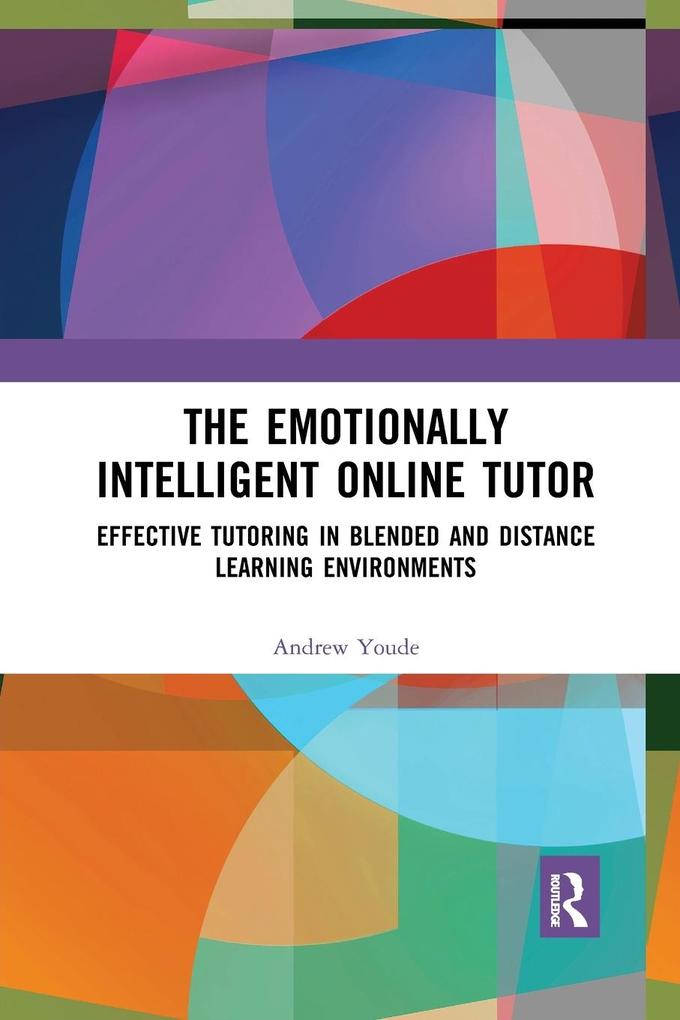
Zustellung: Sa, 21.06. - Mi, 25.06.
Versand in 6 Tagen
VersandkostenfreiBestellen & in Filiale abholen:
The Emotionally Intelligent Online Tutor foregrounds the tutor within online and blended learning environments, and focusses on desirable skills, qualities and attributes for effective tutoring. It analyses these qualities in relation to prominent psychological constructs, such as emotional intelligence, and the exploration of their value in practice.
This book is focussed on the tutoring of adult learners undertaking study within higher education, commonly on a part-time basis whilst studying vocationally relevant degree programmes. However, the contents are applicable and generalisable to those tutoring within informal environments, such as Massive Open Online Courses. Prominent social constructivist models of e-learning are critiqued with alternative actions provided for tutors now practicing in a digital age. The book provides a conceptual model that represents an interpretation of effective practice in a blended learning context.
This book will be of great interest for academics, scholars and postgraduate students in the field of education and for e-tutors delivering online and blended courses. Furthermore, it will be useful for those undertaking teacher training, psychology and counselling courses.
This book is focussed on the tutoring of adult learners undertaking study within higher education, commonly on a part-time basis whilst studying vocationally relevant degree programmes. However, the contents are applicable and generalisable to those tutoring within informal environments, such as Massive Open Online Courses. Prominent social constructivist models of e-learning are critiqued with alternative actions provided for tutors now practicing in a digital age. The book provides a conceptual model that represents an interpretation of effective practice in a blended learning context.
This book will be of great interest for academics, scholars and postgraduate students in the field of education and for e-tutors delivering online and blended courses. Furthermore, it will be useful for those undertaking teacher training, psychology and counselling courses.
Inhaltsverzeichnis
1. E-tutoring: Introduction and Context. 2. Emotional Intelligence and its Value for Tutors in Higher Education. 3. The Utility of the Mayer-Salovey-Caruso Emotional Intelligence Test (MSCEIT) for Identifying Effective Tutors in Online and Blended Learning Contexts. 4. Emotional Intelligence: Trait-Based Models and their Utility for Tutors in Online and Blended Learning Contexts. 5. Motivation and the Adult Learner in Online and Blended Learning Environments. 6. Analysis of Prominent Distance Education Theorisations to Explore Developing Relations in Online and Blended Learning. 7. Effective Teaching in Online and Blended Learning Environments. 8. E-tutor Competences, Skills and Beliefs. 9. Developing Effective E-tutors. 10. Emotionally Intelligent Tutoring. 11. Emotionally Intelligent Tutors and Tutoring: A Summary and Concluding Thoughts. Appendix 1 - An Andragogical Model for Adult Learners Studying in Blended Learning Contexts. Appendix 2 - Course Experience Questionnaire. Appendix 3 - Revised Study Process Questionnaire (R-SPQ)
Produktdetails
Erscheinungsdatum
13. Dezember 2021
Sprache
englisch
Seitenanzahl
198
Autor/Autorin
Andrew Youde
Verlag/Hersteller
Produktart
kartoniert
Gewicht
310 g
Größe (L/B/H)
234/156/11 mm
ISBN
9781032172897
Entdecken Sie mehr
Bewertungen
0 Bewertungen
Es wurden noch keine Bewertungen abgegeben. Schreiben Sie die erste Bewertung zu "The Emotionally Intelligent Online Tutor" und helfen Sie damit anderen bei der Kaufentscheidung.










